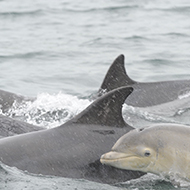
Born Free welcomes a new arrival for its adopted dolphin, ‘Muddy’
'Muddy’ lives in the Moray Firth, off the north coast of Scotland, which is home to 500 bottlenose dolphins protected by the Cetacean Research and Rescue Unit (CRRU).
Supported by Born Free, the CRRU researches and monitors whales and dolphins in the region, and provides veterinary treatment.
Muddy’s new calf, which is still too young to be identified as male or female, was first spotted in May and is thought to have been born in October 2016. This is Muddy’s seventh calf.
Dr Kevin Robinson, CRRU lead researcher, said: “We estimate Muddy gave birth last October, because when we saw her last in September 2016 she only had her older calf, ‘Hiccup’, with her. The new calf is known officially as CRRU ID#643, but we’re sure Born Free supporters can come up with something far better!”
Born Free has launched a competition to find a name for Muddy’s new calf. The competition is open exclusively to all Muddy adopters.
Image (C) Born Free Foundation



 The RCVS has announced a new version of its 1CPD mobile app, with enhanced features for veterinary surgeons and veterinary nurses to record their continuing professional development.
The RCVS has announced a new version of its 1CPD mobile app, with enhanced features for veterinary surgeons and veterinary nurses to record their continuing professional development.